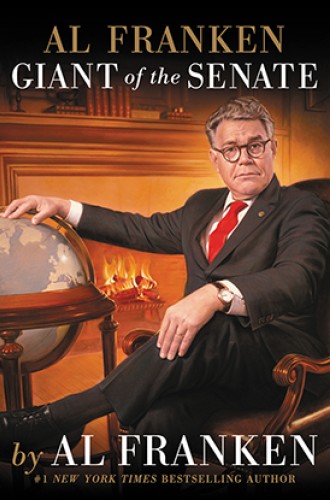The earnest, hilarious Al Franken
The senator's jokes are still funny, even if Trump has made his satire obsolete.
Al Franken is, despite the best efforts of reporters, Republican operatives, Senate colleagues, and his own staff, still funny. The memoir’s title and kitschy cover photo of Franken—longtime performer, writer, and producer for Saturday Night Live, later a gadfly of liberal radio and publishing, and now a twice-elected U.S. senator—reveals that he’s going to mock the self-importance of the genre and himself. But he’s going to do so without brutality, and even with a measure of fondness. The contrast between comedy and politics, and the modest absurdity it can create, gives this book its momentum, its life, and its invitation to serious political engagement.
In becoming a politician, Franken had to both use and live down his lifetime of joke writing. He revisits the out-of-context bits that were turned into political attacks when he first ran for the Senate in 2008. He details the pitfalls of entering the Senate (after a razor-thin victory in a recount and a lengthy court challenge by defeated incumbent Norm Coleman) with a reputation as a clown. In becoming a politician, Franken notes, he had to navigate and master an entirely different mode of interacting with his audience and his material. He learns how to avoid fights with reporters (“So treat the press like they’re alcoholics,” he tells a concerned staffer), how to deflect bad questions, and how to survive the mechanics of a scandal.
Read our latest issue or browse back issues.
In the book’s funniest chapter, Franken narrates an intense inner struggle to restrain himself from making a sophomoric joke in a committee hearing on a bill that would have protected employees from losing their jobs because of their sexual orientation. He quotes the opening statements of his colleagues, interrupted by the blandishments of the angel and the devil perched on his shoulders, contesting the joke. “‘C’mon!!!’ the Devil yelled. ‘Tell the joke! It’ll kill!!!’” Eventually, the angel and the devil each sprout their own angels and devils, and the debate comes down to the angel’s devil (“we have to pick our spots” for jokes) and the devil’s angel (“No one over here is saying we should go for the joke every single time”). It’s a roaring piece of comic writing: a parody of political negotiation that plays on the lively contrasts of comedy and the dull contrasts of respectable political rhetoric.
When it’s not complicating his rise to senatorial gianthood, Franken’s instinct for the joke seems to have served him well. Humor gets people to open fundraising letters and to follow lengthier excursuses on lawmaking and public policy than many politicians would attempt. Humor leavens the generosity with which he depicts Republican senators (Ted Cruz and Norm Coleman notably excepted). Both the satirist and the politician, to be successful, need an eye for frailty that turns both inward and outward. Franken knew the rules of comedy and he learned the rules of the Senate, and in laying them open he shows respect for both.
In the end, however, this is a book about politics. Franken is no clown and no jester. His humor was always too broad and too earnest for that. Franken’s levity makes space for extra honesty, but it does not savagely expose the hypocrisies of the world. One benefit of a political career as unlikely as Franken’s is that it makes his passion for the work of the Indian Affairs Committee or the legacy of the late Paul Wellstone (whose seat he occupies) more plausible. It makes his laments over dishonesty in politics more plausible, too. He’s angry that the nondiscrimination bill whose committee hearing he comically depicts died in the House after passing the Senate.
Franken writes more openly about fundraising than most politicians would dare. And he is willing to point out that, while most of his donors are small-money regular folks, a big share of his total campaign funds come from rich people. But then, when he is nearly done with his serious account of policy problems, he ends up with a lame sputter on income inequality. Education and jobs are well and good, but they won’t change the trend toward a cruelly bifurcated society. Only distributing money away from the very wealthy (including the wealthy who fund Democratic campaigns) will do that. And until it does, there will be bottomless pockets for any candidate who wants to try to unseat even a senator as tireless and scrupulous as Franken appears to be, and for anyone who wants to spread misinformation to do it.
Of course, the whole book stands in the shadow of Donald Trump. While Franken worked hard to make himself respectable and knowledgeable, Trump never bothered. This plainly and understandably infuriates Franken. Although he only mentions it in passing, Franken wrote a book imagining himself as a fraudulent, immoral, unprepared candidate for the presidency in 2000, winning improbably, and then the whole thing collapsing. His “announcement speech,” if it was ever funny, isn’t very funny now: “The pundits, for starters, are complete frauds. To the pundits I have only one thing to say: Who elected you? No one. No one elected you. No one! No one!! NO ONE!!! (ANTICIPATE CROWD CHANTING ALONG.)”
While the humorist was making himself respectable to gain real-world influence, the real world was moving in the opposite direction. The jokes are still funny, but the satire is obsolete. Seriousness and discipline are not an easier path, but at least they still exist.
A version of this article appears in the September 27 print edition under the title “But seriously, folks.”






